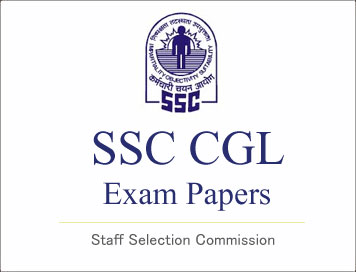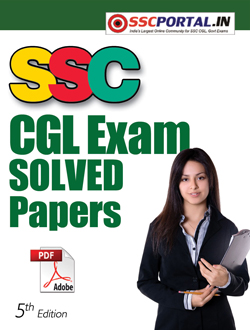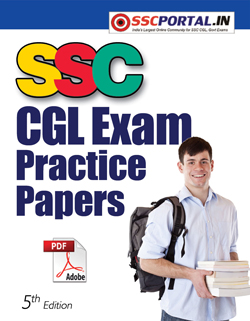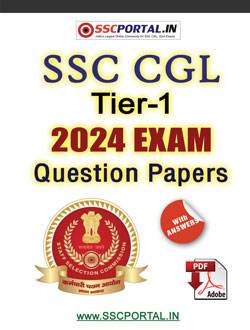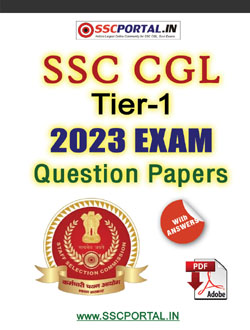NEW! SSC CGL PDF NOTES
SSC CGL (Pre.) Previous Year Solved Paper - 2014, "English Comprehension"
SSC CGL (Pre.) Previous Year Solved Paper - 2014
Subject: English Comprehension
Directions (Q.Nos. 1-5) In the following questions, some parts of the sentence have errors and some are correct. Find out which part of a sentence has an error. If a sentence is free from error, mark (d) as your answer.
1. With our great annoyance (a)/we found the ground (b)/filled with broken glasses. (c)/No error (d)
2. The new device (a)/aims at eliminating (b)/the risk of short-circuiting. (c)/No error (d)
3. I wish to heartily (a)/congratulate you for (b)/your astounding success. (c)/No error (d)
4. The visitor took the vacant seat (a)/next from mine (b)/one of the many huge sofas in the room. (c)/No error (d
5. He was (a)/a learnt man among lords, (b)/and a lord among learned men. (c)/No error (d)
Directions (Q.Nos. 6-10) In the following questions sentences are given with blanks to be filled in with an appropriate word (s). Four alternatives are suggested for each question. Choose the correct alternative out of the four.
6. The book provides an overview of European wines that should prove inviting to both the virtual ........ and the experienced connoisseur.
(a) prodigal
(b) novice
(c) zealot
(d) glutton
7. The Sun is shining brightly, please ........... the light.
(a) put off
(b) put out
(c) take off (d) put on
8. This practice was brought ........... to prevent certain abuses.
(a) about
(b) in
(c) down
(d) off
9. This package was supposed ........... yesterday.
(a) to have been delivered
(b) to deliver
(c) to be delivering
(d) not to be delivered
10. Her true feelings manifested themselves in her sarcastic remarks, only then was her ........ revealed.
(a) sweetness
(b) bitterness
(c) sarcasm
(d) charm
Directions (Q.Nos. 11-13) In the following questions out of the four alternatives, choose the one which best expresses the meaning of the given word.
11. Brutalize
(a) Devise
(b) Strike
(c) Stir
(d) III-treat
12. Pinnacle
(a) Summit
(b) Pit
(c) Capusle
(d) Heart
13. Garble
(a) Communicate
(b) Explain
(c) Confuse
(d) Hide
Directions (Q.Nos. 14-16) In the following questions choose the word opposite in meaning to the given word.
14. Seamy
(a) Unpleasant
(b) Sincere
(c) Honest
(d) Pure
15. Cease
(a) Confront
(b) Confiscate
(c) Abandon
(d) Initiate
(E-Book) SSC CGL (Tier-1) Exam Question Papers PDF
Click Here to Join SSC CGL (Tier -1) Online Crash Course
Click Here to Buy SSC CGL (Tier -1) Study Kit in Print Copy
16. Denounce
(a) Grant
(b) Praise
(c) Signify
(d) Confirm
Directions (Q.Nos. 17-21) In the following questions four alternatives are given for the Idiom/Phrase underlined in the sentence. Choose the alternative which best expresses the meaning of the Idiom/Phrase.
17. Ask Mr. Das. He can give you all the news you need. He is always in the swim.
(a) in search of news
(b) well-informed and upto date
(c) giving news to others
(d) at the swimming pool
18. You have been trying to solve this puzzle for a long time, be careful, so that you avoid barking up the wrong tree.
(a) keep working constantly
(b) climbing the wrong tree
(c) trying to solve problems
(d) trying to find something at a wrong place
19. I’ll be able to do my job very well when I know the ropes.
(a) learn the procedures
(b) gain confidence
(c) become bolder
(d) work in silence
20. The secretary’s thoughtless remark added fuel to the fire.
(a) helped in improving the situation
(b) prevented the situation
(c) added humour to the situation
(d) worsened the difficult situation
21. He could not get money from his master because he rubbed him up the wrong way.
(a) suggested a wrong method
(b) advised him to be strict
(c) Irked or irritated him
(d) asked him to speed up
Directions (Q.Nos. 22-31) In the following questions sentence /a part of the sentence is underlined. Below are given alternatives to the underlined part at (a), (b), (c) which may improve the sentence. Choose the correct alternative. In case no improvement is needed, your answer is (d).
22. The government representative furnished the reporters all details.
(a) provided the reporters all details
(b) furnished reporters all details
(c) furnished the reporters with all the details
(d) No improvement
23. It was raining so heavily yesterday that I could not move out for may usual walk.
(a) I could not go out for my usual walk
(b) I could not move for my usual walk
(c) I could not go to my usual walk
(d) No improvement
24. Ram filled ink into his pen before leaving for school.
(a) filled ink in his pen
(b) filled his pen with ink
(c) filled ink on his pen
(d) No improvement
25. The toys he bought for Suzy are too to be che
(a) are so much good to be cheap
(b) are so good that to be cheap
(c) were so good to be cheap
(d) No improvement
26. I did one mistake in the dictation test today.
(a) I made a mistake in
(b) I did a mistake in
(c) I did a mistake at
(d) No improvement
27. John has been detained at a meeting.
(a) by the meeting
(b) on a meeting (c) in meeting
(d) No improvement
28. The butler was as devoted as a faithful dog.
(a) a faithful cat
(b) a faithful pet
(c) a faithful friend
(d) No improvement
29. He denied that he had not forged my signature.
(a) would not forge
(b) had forged
(c) did not forge
(d) No improvement
30. There is an error in grammar in the sentence.
(a) a written error
(b) a grammar error
(c) a grammatical error
(d) No improvement
31. To his astonishment and admiratior, he got the information that it was only the picture of a curtain.
(a) found
(b) saw clearly
(c) received the information
(d) No improvement
Directions (Q.Nos. 32-38) In the following questions out of the four alternatives, choose the one which can be substituted for the given words/sentence.
32. Having a stale small or taste.
(a) Savoury
(b) Tepid
(c) Rancid
(d) Insipid
33. A wooden object used for connecting animals that are pulling a vehicle.
(a) Whip
(b) Yoke
(c) Rein
(d) Leash
34. A man who knows a lot about things like food, music and art.
(a) Hostage
(b) Connoisseur
(c) Priest
(d) Optimist
35. A doctor who specializes in diseases of the nose.
(a) Pathologist
(b) Podiatrist
(c) Rhinologist
(d) Otologist
36. Study of caves.
(a) Topology
(b) Numismatics
(c) Speleology
(d) Seismology
37. Government be the few.
(a) Monarchy
(b) Anarchy
(c) Oligarchy
(d) Autocracy
38. Materials that change naturally by the action of bacteria.
(a) Biological
(b) Biodegradiable
(c) Inflamm
(d) Perishable
Directions (Q.Nos. 39 and 40) In the following questions four words are given in each question, out of which only one word is correctly spelt. Find the correctly spelt word.
39. (a) Extirpate
(b) Extripaite
(c) Exterpate
(d) Exitrpeit
40. (a) Intelligibility
(b) Inteligibility
(c) Inteligibelity
(d) Inteligibillity
Directions (Q.Nos. 41-50) You have two brief passages with five questions following each passage. Read the passages carefully and choose the best answer to each question out of the four alternatives.
Passage I
A crucial element that defines the soap opera is the open-ended nature of the narrative, with stories spanning several episodes. One of the defining features that makes a television program a soap opera, according to Albert Moran, is “that form of television that works with a continuous open narrative. Each episode ends with a promise that the storyline is to be continued in another episode.”
In 2012, Robert. Lloyd of the Los Angeles Times wrote of daily dramas, “Although melodramatically eventful, soap operas such as this also have a luxury of space that makes them seem more naturalistic, indeed, the economics of the form demand long scenes and conversations that a 22-episodes-per-season weekly series might dispense with half a dozen lines of dialogue may be drawn out, as here, for pages. You spend more time even with the minor characters the apparent villains grow less a apparently villainous.
Soap opera storylines run concurrently, intersect and lead into further developments An individual episode of a soap opera will generally switch between several different concurrent “.arrative threads that may at times interconnect and affect one another or may run entirely independent of each other. Evening soap operas and serials that run for only a part of the year tend to bring things to a dramatic end-of-season cliffhanger.
41. What does the author mean ‘by the open -ended nature of soap operas?
(a) Every episode ends shruptly
(b) Consecutive episodes nave no connection
(c) Each episode ends with a promise that the storyline is to be continued in another episode
(d) Every episode has a different story
42. A soap opera has the space for it to be more
(a) dramatic
(b) tragic
(c) artistic
(d) naturalistic
43. The economics of a soap opera form demands for it to have
(a) melodramatic events
(b) promising storylines
(c) long scenes
(d) luxurious space
44. An individual episode of a soap opera generally switches between
(a) successive intersections of events
(b) different concurrent narrative threads
(c) more time spent with minor characters
(d) apparent villains that grow less apparent villainous
45. Soap operas that run for a part of the year usually end in
(a) a cliffhanger
(b) a sequence
(c) a cliff
(d) an episode
Passage II
Two or three days and nights went by, 1 reckon I might say they swam by they slid along so quiet and smooth and lovely. Here is the way we put it in the time. It was a monstrous big river down there-sometimes a mile and a half wider we ran rights, and laid up and hid daytimes, soon as night was most gone we stopped navigating and tied up nearly always in the dead water under a towhead and then cut young cotton woods and willows and hid the roft with them-Then, we set out the lines. Next we slid into the river and had a swim, so as to freshen up and cool, off then we set down on the sandy bottom where the water was about knee deep and watched the daylight come. Not a sound anywhere-perfectly shill just like the whole word was asleep, only sometimes, the bullfrogs a cluttering maybe. The first thing to see, looking away over the water, was a kind of dull line- that was the woods on other side, you couldn’t make nothing else out, then a pale place in the sky, then more paleness spreading around, then the river softened up away off and warm black any more, but gray you could see little dark spots drifing along ever so far away-trading scowe and such things and long black streaks-rafts sometimes you could hear a sweep creaking, jumbled up voices, it was so still and sounds comes so far and by and by you could see a streak on the water which you know by the look of the streak that there’s snag there in a current which breaks on it and makes that streak look that way.
46. How did the days and nights go by, according to the writer?
(a) They slid along so smooth and soft and quietly
(b) They slid along so quietly and smooth and softly
(c) They slid along so quiet and smooth and lovel
(d) They slid along so smooth and quietly
47. They stopped navigating
(a) at daytime
(b) at dawn
(c) at night
(d) at dusk
48. After a swim in the moor they
(a) set down on the sandy shore and watched the daylight come
(b) set down on the sandy bottom and watched the daylight come
(c) set down on the sandy bottom where the water was about ankle deep and watched the daylight come
(d) set down on the sandy bottom where the water was about knee deep and watched the daylight come
49. In the stillness of the night
(a) the whole world was asleep
(b) a sweep creaking or jumbled up voices could be heard
(c) sound come so far
(d) the bullfrogs also were asleep
50. The streak on the water looks as it does because
(a) of a sang there in the swift current which breaks on it
(b) the streak has been swept by the swift current
(c) the swift current has broken the streak
(d) the streak has been swept by the swift current to the shore
ANSWER
1. (a) 2. (c) 3. (b) 4. (b) 5. (b) 6. (b) 7. (b) 8. (b) 9. (b) 10. (b) 11. (d) 12. (a) 13. (c) 14. (d) 15. (d) 16. (b) 17. (b) 18. (d) 19. (a) 10. (d) 21. (c) 22. (c) 23. (a) 24. (b) 25. (d) 26. (a) 27. (d) 28. (d) 29. (b) 30. (c) 31. (a) 32. (c) 33. (b) 34. (b) 35. (c) 36. (c) 37. (c) 38. (b) 39. (a) 30. (a) 41. (c) 42. (d) 43. (c) 44. (b) 45. (a) 46. (c) 47. (b) 48. (d) 49. (a) 50. (a)


